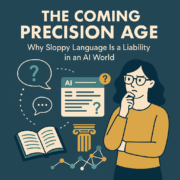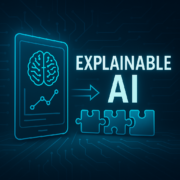LLMs Aren’t Thinking — They’re Just Really Good at Finishing Your Sentences
ChatGPT sounds smart. Sometimes, it feels like it really gets you. Like there’s a mind behind the words.
There isn’t.
That’s not to say it’s useless. Far from it. But here’s the crucial truth:
Large Language Models—LLMs—don’t think. They don’t reason. They don’t understand.
They complete patterns. And that difference matters.
So why does it feel so intelligent?
Because language itself carries the structure of reasoning.
Every book, email, manual, or article you’ve ever read encodes ideas—opinions, logic, explanations. LLMs don’t get them; they copy the form.
They’re trained on trillions of words, learning not facts but the shape of language.
When you ask a question, they find patterns that look like an answer and reproduce those patterns.
If your prompt follows a reasoning-like structure, the response follows suit.
It’s like watching a parrot recite perfectly: it sounds like understanding, but it’s just memorized mimicry.
What Apple’s research reveals
Apple’s recent Machine Learning study confirms what many already suspected: LLMs don’t reason. In a series of controlled tests—like Tower of Hanoi and river-crossing puzzles—they tested top-tier “reasoning” models (OpenAI’s o3, Google’s Gemini, Anthropic’s Claude 3.7).
Their findings:
Accuracy plunged on more complex tasks—far more than simpler models news.ycombinator.com+5reddit.com+5youtube.com+59to5mac.com+3theguardian.com+3marketwatch.com+3arxiv.org.
As puzzles got harder, models actually reduced their internal reasoning steps—showing a kind of AI burnout 9to5mac.com+3theguardian.com+3marketwatch.com+3.
Even when given the exact algorithm, they couldn’t reliably apply it marketwatch.com+19to5mac.com+1.
Essentially, they’re mimicking reasoning without real understanding—a layered pattern-match, not logic machinelearning.apple.com+109to5mac.com+10news.ycombinator.com+10.
In simple terms: they simulate thought—not by thinking, but by stringing together patterns that look like reasoning.
Why this distinction matters
It may seem technical, but here’s the practical risk:
People assume LLMs “understand”, so they trust them—too much.
You get convincing hallucinations (plausible but false answers), especially on complex topics.
People believe they’re interacting with an intelligent agent—but it’s a master of mimicry, not meaning.
These systems excel at reflecting your ideas. They fail at originating thought. And when tasks get complex, logic cracks.
Final thought
LLMs aren’t magic.
They’re not sentient.
They’re not reasoning.
They’re reflections of the language—and reasoning—they’ve been trained on. Scarily good reflections—but still reflections.
Treat them with respect—but not as thinking entities.
Ask them to help. Challenge them. But never mistake clever performance for actual understanding.
Because underneath it all—deep down—they’re just really good at finishing your sentences.









Leave a Reply
Want to join the discussion?Feel free to contribute!